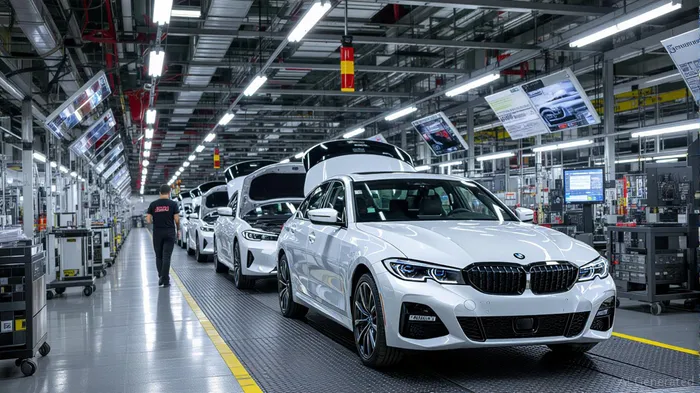Reshoring the Atlantic: How Trade Tensions Are Creating Hidden Gems in EU Manufacturing
The European Union's decision to extend the suspension of trade countermeasures against the U.S. until August 1, 2025, underscores a prolonged period of cross-Atlantic economic uncertainty. While the delay buys time for negotiations, it also signals that businesses must prepare for a new normal: a fragmented supply chain landscape where reliance on transatlantic logistics is increasingly risky. For investors, this environment presents a unique opportunity to identify companies that are reshaping manufacturing strategies to thrive in a world of trade friction. The automotive and tech sectors are leading the way, with underappreciated equities emerging in regions like Germany and the Netherlands.
The Reshoring Imperative: Why Companies Are Rebuilding Locally
The EU's “wait and see” approach to tariffs—avoiding the activation of its Anti-Coercion Instrument—has not reduced uncertainty. U.S. threats to impose 30% tariffs on EU goods starting August 1, paired with the EU's €72 billion countermeasure plan, create a high-stakes game of chicken. For companies, the solution is clear: reshore production closer to key markets to avoid tariff volatility and logistical bottlenecks.

Automotive: Germany's Pivot to Reshored EV Production
Germany's automotive industry—still the EU's economic linchpin—has been hit hard by U.S. tariffs. The 25% duty on car imports has forced companies to rethink their U.S. strategy. Volkswagen's $52 billion bet on U.S. manufacturing is a masterstroke: its Alabama plant now supplies 35% of its U.S. sales, avoiding tariffs entirely. The move is paying off as EV demand surges—battery-electric vehicle (BEV) registrations in Germany jumped 56% in May 不在乎2025, a trend Volkswagen is capitalizing on with its ID.3 and ID.4 models.
Despite near-term margin pressures from rising steel costs (up 14% year-to-date), Volkswagen's scale in EV production offers a path to profitability. Competitors like BMW and Mercedes-Benz are following suit. BMW's i5 and i7 EVs are gaining traction in the U.S., while Mercedes is cutting costs through $1.2 billion in AI-driven efficiency projects.
Investment Takeaway: Volkswagen (VOW3) remains the core play here. Its U.S. manufacturing footprint and leadership in EVs position it to capture pent-up demand if a tariff deal emerges by August.
Tech: The Netherlands' Semiconductor Play and Data Sovereignty Shift
The Dutch tech giant ASMLASML-- is a prime example of reshoring's complexity. Its extreme ultraviolet (EUV) lithography machines—critical for semiconductor manufacturing—face a 20% U.S. tariff, inflating costs for U.S. chipmakers by $70 million per machine. To offset this, ASML is exploring localized production and diversifying its customer base. The company's stock has held up remarkably well, but its resilience hinges on its monopoly in EUV technology.
Beyond semiconductors, the Dutch are leading a broader shift toward data sovereignty. The U.S. Cloud Act's threat to data access has spurred demand for EU-based cloud infrastructure. Initiatives like the Sovereign European Cloud API (SECA) aim to create a unified European tech stack, reducing reliance on U.S. providers. Dutch cloud firms like Fasthosts and infrastructure plays like Royal IHC (a specialist in offshore wind) are beneficiaries of this trend.
Investment Takeaway: ASML (ASML) is a speculative buy for its irreplaceable tech, but the real underappreciated gem is Siemens Energy (SIEGY). Its role in grid infrastructure and hydrogen projects aligns with the EU's Green Deal, offering stable cash flows even in trade chaos.
The Regional Play: Germany's Utilities and the Netherlands' Tech Hubs
While automotive and tech grab headlines, the reshoring boom also benefits defensive sectors. Germany's utilities, like Snam (with its 5.5% dividend yield), and Siemens Energy (SIEGY) are insulated from trade disputes through regulated assets and green investments. Meanwhile, the Netherlands' tech ecosystem—anchored by ASML and cloud innovators—is a growth engine for investors seeking exposure to EU self-reliance.
ETF Strategy: Pair sector picks with the WisdomTree European Opportunities Fund (OPPE), which overweights industrial automation and energy transition plays.
Risks and the August Deadline
The biggest overhang remains the August 1 deadline. If tariffs escalate, EU exporters face a €93 billion trade shock. Investors should hedge with:
1. Short-term puts on auto stocks like BMW (BMW) until clarity emerges.
2. Long positions in ETFs like EZU, which tracks broader European equities.
3. Geopolitical hedges in defense stocks like Rheinmetall (WHM), which benefit from EU military spending.
Conclusion: Reshoring Isn't a Crisis—It's a Catalyst
The extended EU-U.S. trade stalemate is forcing companies to rebuild supply chains from scratch. For investors, this is a generational opportunity to buy into reshored manufacturing plays—particularly in EVs (VW), semiconductors (ASML), and green infrastructure (SIEGY). The August deadline will test nerves, but the long-term winners will be those who bet on localization now.
Final Call: Buy the dip in Volkswagen and Siemens Energy ahead of August; avoid pure-play exporters until tariffs are resolved. The reshored economy is here to stay.
Tracking the pulse of global finance, one headline at a time.
Latest Articles
Stay ahead of the market.
Get curated U.S. market news, insights and key dates delivered to your inbox.



Comments
No comments yet